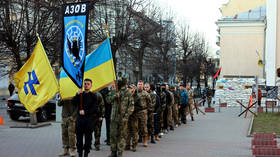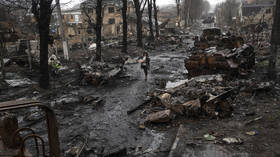Evgeny Norin: Bucha needs to be properly investigated, not used for propaganda
The tragic civilian deaths must be assessed honestly, not used to fuel the information war
By Evgeny Norin, a Russian historian focused on Russia’s wars and international politics
The Russian military offensive in Ukraine is still under way and recent events have sent shockwaves across the globe. A few days after troops withdrew from the small town of Bucha, near Kiev, the Ukrainian authorities reported finding multiple bodies of dead civilians. What happened in Bucha is now being compared to the Srebrenica massacre – the Balkan town which became a symbol of the deadly war in Yugoslavia. Here’s what should be kept in mind about this.
Civilian deaths are always a tragedy, without any doubt, and they need to be investigated properly. The rebellion in the Donbass and the military assault now resulting from it can be called one of the bloodiest armed conflicts in the post-Soviet space. The widespread destruction of Mariupol during Moscow’s offensive, a group of Russian POWs shot by Ukrainians, and a missile attack on residential areas of Donetsk by Kiev’s forces are just some of the atrocities this war has seen so far.
Bucha is another one on this list. In the period between February 25 and the middle of March, when Russian troops controlled this small town, it saw fierce fighting. But around the end of March, the Russians left and the Ukrainians entered the town, followed by journalists from French state media. They found dozens of dead civilians, some of which had been there, unburied, for days or even weeks, according to the journalists.
What happened in Bucha is undoubtedly a terrible tragedy. It is also worth mentioning that both Russia and Ukraine sought a UN Security Council emergency meeting about what has happened in the town. However, the two countries describe what happened there in opposite terms.
As of now, little can be said with certainty about events in Bucha. But one thing is clear – this tragedy calls for a proper investigation.
However, some observations can be made right away. Most of these people must have been killed by artillery fire. There are several factors that support this theory. The most evident proof is that some of the bodies were found next to what look like shell craters, as seen in the videos. Fighting took place right on the streets of Bucha. On February 27, a large Russian military convoy was hit by Ukrainian artillery fire on Vokzalnaya street. The shelling by the Ukrainian military did not stop even after Russian troops seized the town.
It has to be mentioned that both armies mainly use old tube and rocket artillery systems firing conventional high-explosive shells which have low target accuracy. When used in populated areas, they can easily kill someone even if they are far away from the actual target.
On the other hand, armored vehicles were maneuvering along the streets of Bucha all the time, which unfortunately can lead to casualties among civilians, even when the troops don’t want it to happen. Visibility from inside an armored vehicle is very low, so the odds of crushing civilian vehicles when performing sharp maneuvers are very high. Local militia units actively use civilian transport, including ambulances, something which has become a distinctive characteristic of combat operations in Ukraine. This often leads to the military firing at any vehicles they find suspicious.
Moreover, at least one of the bodies found on the road had their hands tied with a piece of white cloth. Oddly enough, this particular circumstance has a reasonable explanation – it is common practice to tie a corpse’s hands together for transportation, so that they don’t hang loose. The hands of killed rebel fighters, brought to a morgue in Donetsk in May 2014, were bound the same way. Back then it prompted speculation that the men had been executed.
And finally, it has to be said that there are always gangs of looters operating in any war, whose actions are not driven by ideology. The mass distribution of weapons among the local population has made criminal groups stronger, which is confirmed by the fact that many of the bandits seized at crime scenes were heavily armed.
The people whose bodies were found in Bucha, were most likely killed at various times and as a result of various occurrences, which explains, by the way, the strange indifference to the tragedy on local social media. As opposed to the reaction in the English-language press.
This article is not intended to accuse or exonerate anyone, but the author would like to remind the reader that it always takes an unbiased investigation, and preferably an international one, to draw a line under a serious matter like this. Such tragedies can’t be prevented when two armies are fighting in an urbanized, densely populated area, with lots of civilians present.
Right now, the only thing we know for sure about Bucha is that it is a terrible tragedy of war. The victims have to be mourned and commemorated, and combat actions need to be brought to an end by peace talks as soon as possible. Specific episodes of civilian deaths must be investigated properly in order to clarify the circumstances of each tragedy.
It’s only natural to be overwhelmed with emotions at the sight of a disfigured corpse, but let’s not forget that any story of this kind also sets in motion military propaganda. Particularly in today’s social media-era, when such campaigns can manipulate global opinion in just a few hours.
We must make sure that we are not misled by that too.
The statements, views and opinions expressed in this column are solely those of the author and do not necessarily represent those of RT.







Comments are closed.